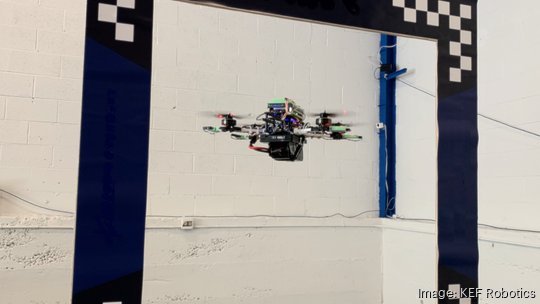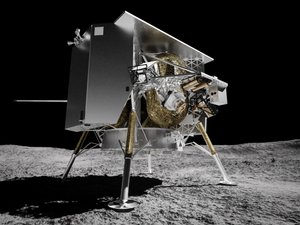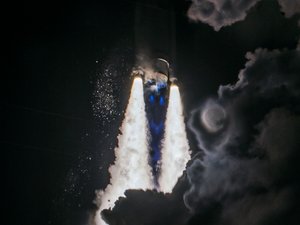
East Liberty-based autonomous aircraft software developer KEF Robotics recently announced a $1 million grant from AFWERX, the Air Force's venture capital arm. It's the latest in a multi-million dollar series of military investments in the region toward autonomous systems.
KEF's focus is currently on developing a navigational system that is not reliant on GPS. These ideas have recently received influential "lessons coming out of Ukraine," which contributed to the $1 million Tactical Funding Increase.
"You have this fairly new battlefield where the aircraft that we happen to be developing for for the past six years are now one of the most frequently used assets on the battlefield, whether it's for [intelligence, surveillance and reconnaissance], signal relay, or increasingly for striking targets," KEF CEO Fraser Kitchell said. "These aircraft are running up against limitations, in that their signals can be jammed, and they're losing their capacity. Some of what we're doing with this TACFI (Tactical Funding Increase) and what we're generally focused on at KEF is allowing an aircraft to do more things autonomously, meaning fly without a GPS or fly without a human pilot."
Local military investment is growing
Military investment in the region has increased in recent years as Pittsburgh has shaped into a leading technology cluster. AFWERX has invested over $36 million to companies in the Pittsburgh region since 2021, with a focus on robotics, the space sector and autonomy. The U.S. Army invested $14.8 million in two local autonomous vehicle companies last year and has previously awarded KEF a a $1.5 million award.
Kitchell said that autonomous aerial technology can have testing advantages when compared to self-driving cars because "the rules of the road in the sky are much easier and the sky is much bigger, and you can carefully control the airspace to provide a pretty easy road for adding autonomous capabilities." However, from a hardware standpoint, ground technology can have advantages.
"Cars can carry unlimited computing because you have a big powerful engine or system and you can carry a lot of processing," Kitchell said. "It doesn't matter if you add more weight to the car because it generally doesn't affect the performance."
Aircraft, on the other hand, requires a much more nuanced ratio of computing weight, camera and sensor hardware and flight mechanics. As energy and computational efficiency has improved over the years, KEF is "riding the back of this infrastructure" and expects to benefit from future improvements in the space.
KEF's software is currently used in drones, but the company plans to have the software usable for aircraft of all sizes.
The discussion over autonomous aircraft for combat
The Air Force has been researching similar technology elsewhere and expects to spend $5.3 billion over the next few years to develop a combative autonomous aircraft. Much of that funding will go toward an existing prototype of the XQ-58A Valkyrie, which has been used autonomously in simulated combat missions. Defense Deputy Secretary Kathleen Hicks has said that autonomous combative aircraft technologies will be needed to remain competitive in the years to come.
But that viewpoint is not necessarily shared by her boss. Last November, President Joe Biden was set to pledge a complete ban on the usage of autonomous weapons alongside Chinese President Xi Jinping, but the two stopped short, instead discussing next steps for the technology.
"We're gonna get our experts together to discuss risk and safety issues associated with artificial intelligence," Biden said at a press conference following the meeting. "Every major leader wants to talk about the impact of artificial intelligence. These are tangible steps in the right direction to determine what's useful and what's not useful, [what's] dangerous and what's acceptable."
Broader concerns about how autonomy will play a role in the future of warfare have been expressed by a coalition of lawmakers, policy experts and military organizations. U.N. Secretary-General Antonio Guterres previously issued a statement that "the autonomous targeting of humans by machines is a moral line that we must not cross." The Pentagon has issued similar statements, but the U.S. has not put forth a policy on the development of autonomous weapons systems.
As KEF's focus is on navigation components, not weaponry, Kitchell said that "we don't have a strong opinion" and that "it's definitely not our decision to make."
Potential mandates of autonomous technology stemming from the aforementioned fears could still effect the broader Pittsburgh region's autonomy cluster, and it is possible that a ban on autonomous systems in the military could effect non-weapons systems.
Development beyond the military
Despite the military connection, KEF is not only focused on developing autonomy solutions for military aircraft. Kitchell suggested several commercial options, including using the technology in drones to use as window washers. Once the technology becomes more realized for larger aircraft, the company hopes to offer its solutions to commercial airlines to improve safety and navigations.
"Every single aircraft will have cameras and computers on them that are running safety, navigation and hazard detection algorithms and hopefully those are KEF algorithms," Kitchell said. "We have a very talented young team that generally gets excited by research and development and by pushing what's possible with small aircraft. It's people who are very good with computers and software but also like doing things in the real world."









